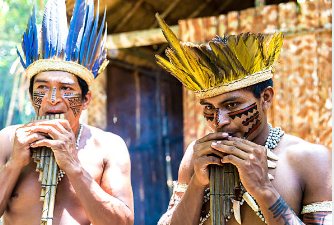The Waorani, an indigenous group residing in the heart of the Ecuadorian Amazon are often referred to as the Guardians of the Amazon. Their unique culture profound knowledge of the rainforest and resilient spirit highlight their crucial role in the conservation of one of the world’s most biodiverse ecosystems. This in-depth essay examines the history customs and difficulties faced by the Waorani people. They face ongoing efforts to protect their environment all while being optimized for search engines with the keywords Exploring Guardians of the Amazon.
Who Are the Waorani?
Waorani Cultural and Linguistic Background
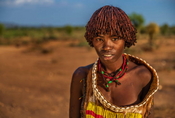
Huaorani are a people of about 4,000 who live mostly in the Ecuadorian regions of Pastaza and Napo.
They speak the Waorani language which is a linguistic isolate meaning it has no known relatives. This unique language is not just a means of communication serves as a conduit for their worldview, culture, and history.
Traditional lifestyle is deeply rooted in their relationship with the Amazon rainforest. They have lived semi-nomadically for centuries relying on the forest for food shelter and medicine.
Their deep understanding of the soil demonstrates a sustainable way of existence. their ability to thrive within one of the planet’s most complex ecosystems.
Waorani Historical Context
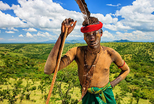
The history of the Waorani is rich and complex. They lived in relative isolation at first until they started interacting with outsiders in the middle of the 20th century. This interaction was often fraught with violence leading to significant loss of life and disruption of their traditional way of life.
In the 1950s missionaries and oil companies began encroaching on Waorani territory which resulted in a series of conflicts.
Despite these adversities, the Waorani have shown incredible fortitude. Working to protect their land and culture against external threats.
The Waorani Way of Life
Traditional Practices
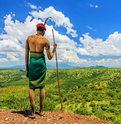
Cultural practices are intrinsically linked to their environment. Key aspects of their traditional way of life include:
- Hunting and Gathering: The Waorani are well-known hunters who capture a variety of wildlife with standard blowguns and traps. Including monkeys birds and wild pigs. Their knowledge of the rainforest allows them to identify edible fruits nuts and roots ensuring a diverse and nutritious diet.
- Medicinal Knowledge: The tribe possesses extensive knowledge of the medicinal properties of rainforest plants. They utilize a range of natural remedies to treat ailments which underscores their deep knowledge of the complexity of the natural world.
- Spiritual Beliefs: The Waorani view the rainforest as a sacred entity inhabited by various spirits. Their spiritual practices often include rituals and rituals that honour these spirits and strengthen their responsible role in the land.
Social Structure
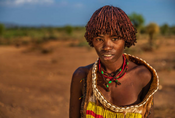
Waorani society is organized into small clans for decision-making. Elders hold a respected position guiding the community with their wisdom and knowledge of traditional practices.
The strong emphasis on community and family bonds is evident in their social interactions. Where storytelling shared activities and communal gatherings play a vital role in maintaining cultural continuity.
Challenges Faced by the Waorani
Environmental Threats

The most pressing challenges facing the Waorani are environmental degradation and loss of territory. The Amazon rainforest is under constant threat from industrial activities, particularly oil extraction and logging. Which have profound implications for the Waorani and their way of life.
- Oil Extraction: The Ecuadorian government has granted oil companies access to large portions of Waorani territory. This has led to significant environmental destruction including deforestation contamination of water sources and disruption of wildlife habitats. The impact of oil drilling not only threatens the rainforest but also poses health risks to the Waorani as pollution can lead to serious health issues.
- Deforestation: In addition to oil extraction logging and agricultural expansion are major contributors to deforestation in the region. The loss of forest cover impacts the biodiversity that the Waorani rely on for their food medicine and cultural practices.
Cultural Erosion
As the outside world encroaches on their territory the Waorani face the risk of cultural erosion. Younger generations are increasingly exposed to modern lifestyles leading to a decline in traditional practices and language.
The allure of modern conveniences can overshadow the importance of cultural heritage threatening the transmission of traditional knowledge from elders to youth. This loss could result in a diminished sense of identity and community.
Health Issues
Access to healthcare remains a significant challenge for the Waorani. Many still rely on traditional medicine but the introduction of Western diseases often brought by outsiders has created health crises in their communities.
The lack of adequate healthcare facilities and services exacerbates these issues making it difficult for the Waorani to access necessary medical care.
Efforts to improve healthcare access must also respect and integrate traditional practices to be effective and culturally sensitive.
Advocacy and Preservation Efforts Environmental Activism
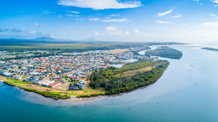
In response to the threats they face numerous organizations and activists are collaborating with the Waorani to protect their rights and land.
Advocacy efforts have garnered international attention emphasizing the importance of indigenous knowledge in addressing environmental issues.
- Legal Battles: The Waorani have engaged in legal actions against oil companies and the government to defend their territory. In a landmark ruling in 2019, they successfully halted oil drilling in parts of their ancestral land. Showcasing the power of indigenous rights and the legal system in protecting the environment.
- Sustainable Practices: Some Waorani communities are exploring sustainable economic alternatives such as eco-tourism. By sharing their culture and knowledge of the rainforest with visitors they can generate income while promoting environmental conservation. These initiatives raise awareness about the importance of the Amazon rainforest and the Waorani’s role in its preservation.
Cultural Revitalization
Efforts to revitalize Waorani culture are ongoing focusing on language preservation and traditional education. Community-led programs aim to teach younger generations about their customs stories and the significance of their relationship with the rainforest.
- Language Preservation: Initiatives to document and teach the language are essential for cultural continuity. Language is a vital component of identity and preserving it helps maintain the tribe‘s unique worldview.
- Cultural Education: Workshops and cultural events are being organized to engage youth and instil pride in their heritage. By fostering a sense of identity and belonging these initiatives help combat cultural erosion and ensure the survival of traditions.
The Importance of the Waorani
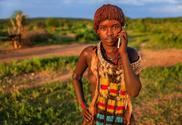
Are more than just an Indigenous tribe they represent a crucial link between humanity and the natural world.
Their struggles underscore broader issues of environmental degradation cultural preservation and human rights making their story relevant on a global scale.
A Global Perspective
The challenges faced by the Waorani resonate with indigenous communities worldwide. Their fight to protect their land and culture is emblematic of the broader struggle for indigenous rights.
As climate change intensifies ecosystems face unprecedented threats. The knowledge and practices offer valuable insights into sustainable living and environmental stewardship.
The preservation of their culture is not only important for their identity but also vital for the global community in addressing pressing environmental challenges.
Conclusion
They stand as guardians of the Amazon, embodying a profound understanding of their environment and a commitment to preserving their culture. Their ongoing struggle to protect their land from exploitation serves as a powerful reminder of the importance of Indigenous rights and environmental conservation.
